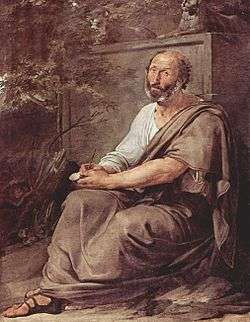Moderate realism
Moderate realism (also called immanent realism) is a position in the debate on the metaphysics of universals which holds that there is no realm in which universals exist (in opposition to Platonic realism who asserts the existence of abstract objects), nor do they really exist within particulars as universals, but rather universals really exist within particulars as particularised, and multiplied.

Overview
Moderate realism is opposed to both extreme realism (such as the theory of Platonic forms) and nominalism. Nominalists deny the existence of universals altogether, even as particularised and multiplied within particulars.
Aristotle espoused a form of moderate realism as did Thomas Aquinas, Bonaventure, and Duns Scotus (cf. Scotist realism).[1] Moderate realism is anti-realist about abstract objects, just like conceptualism is (their difference being that conceptualism denies the mind-independence of universals, while moderate realism does not).[2]
A more recent and influential version of immanent realism has been advanced by Willard Van Orman Quine, in works such as "Posits and Reality" (1955),[3] and D. M. Armstrong, in works such as his Universals: An Opinionated Introduction (1989, p. 8).
See also
- Abstract object
- Conceptualist realism
- Hylomorphism
- In re structuralism
- Instantiation principle
- Medieval realism
- Model-dependent realism
- Nominalism
- Object (philosophy)
- Platonic form
- Strong realism
- Universal (metaphysics)
References
- Nominalism, Realism, Conceptualism – Catholic Encyclopedia (1913)
- Neil A. Manson, Robert W. Barnard (eds.), The Bloomsbury Companion to Metaphysics, Bloomsbury, 2014, p. 95.
- Scientific Realism and Antirealism – Internet Encyclopedia of Philosophy


